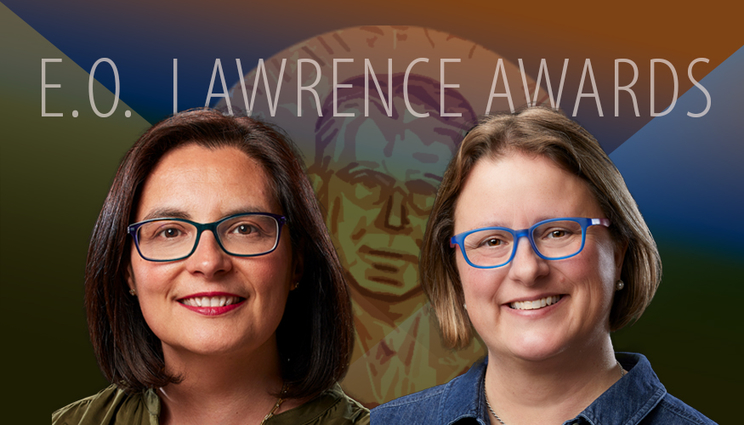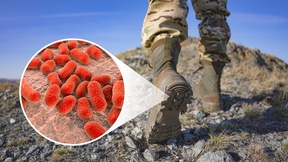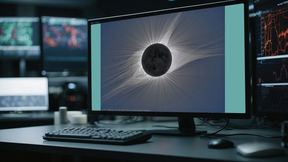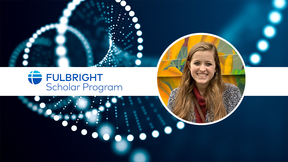Two LLNL scientists earn E.O. Lawrence Award
 (Download Image)
(Download Image)
Sofia Quaglioni and Jennifer Pett-Ridge have been honored as E.O. Lawrence award recipients.
Two Lawrence Livermore National Laboratory (LLNL) scientists are recipients of the prestigious 2021 E.O. Lawrence Award that recognizes mid-career U.S. scientists and engineers for exceptional scientific, technical and engineering achievements related to the broad missions of the Department of Energy (DOE) and its programs.
Jennifer Pett-Ridge was recognized for her research in biological and environmental sciences for pioneering work in quantitative microbial ecology and leadership in developing and applying isotopic tools that help us discover and quantify how changing climate shapes the roles of microorganisms and plants in environmental biogeochemical cycles. Sofia Quaglioni was cited for her work in nuclear physics, specifically for seminal contributions unifying the theory of structure and reactions of light nuclei, providing predictive capability critical for understanding inertial fusion and nuclear astrophysics, as well as pioneering applications of quantum device simulations for nuclear dynamics.
“I am thrilled to recognize these researchers and the significant advances they have contributed to society. Scientists like these individuals are the backbone of DOE and we cannot achieve our mission without them. I’m excited to see what the future holds for them and where they may lead us,” said Asmeret Asefaw Berhe, director of the DOE Office of Science.
Jennifer Pett-Ridge
Pett-Ridge joined the Lab in 2005 and is a senior staff scientist, group leader of Environmental Isotope Systems, principal investigator of the DOE BER “Microbes Persist” Soil Microbiome Scientific Focus Area and an adjunct full professor in the Life and Environmental Sciences Department at UC Merced. She uses microbial ecology, isotope tracing/imaging (NanoSIMS), molecular systems biology and biogeochemistry to link identity and function in environmental microbiomes.
As the PI of LLNL’s “Microbes Persist” project and founder of LLNL’s Genomic Science Biofuels Scientific Focus Area, she coordinates multi-disciplinary teams working on plant-microbial interactions for sustainable biofuels and microbiome interactions that underpin soil carbon persistence. She currently leads the Soil Carbon Uptake team for LLNL’s Carbon Initiative and “National Getting to Net-Zero” analysis, a U.S. county-level economy-wide evaluation of carbon dioxide removal.
“It feels really wonderful, and both humbling and validating to receive this award,” Pett-Ridge said. “I’ve spent most of my career working with, building up and leading research teams, and our research output speaks to what that collaborative, interdisciplinary approach can enable. I’m not a person with a singular breakthrough — instead I’ve worked on multiple systems, developed methods and gained a rich appreciation for both fundamental and applied questions. It means so much to me that DOE and the review committee valued that kind of career path.”
Sofia Quaglioni
Quaglioni, a physicist and group leader in the Nuclear Data and Theory group, joined the Lab just shy of 16 years ago as of this July, and is the principal investigator of the DOE Nuclear Physics (NP)-funded computational nuclear structure and low-energy reactions research at LLNL. Her research focuses on combining first-principle theory and high-performance computing simulations to explain how two nuclei made of interacting protons and neutrons collide and react to form a heavier nucleus. From there, she predicts the rates of thermonuclear reactions between light nuclei during the Big Bang, in the interior of stars and in terrestrial fusion experiments.
More recently, she’s taken interest in the application of emerging quantum computing platforms to the simulation of nuclear dynamics. She is the principal investigator of the DOE NP Quantum Horizons project “Near-Term Quantum Simulations for Nuclear Physics.” In her various roles at LLNL, Quaglioni also contributes to the Stewardship Science Program, through the evaluation of cross sections that directly impact the DOE’s national security and non-proliferation mission.
“I am incredibly honored to receive this esteemed award and still a little overwhelmed by the thought of being placed in such distinguished ranks as those of the past E.O. Lawrence laureates, who have made far more profound contributions to science and society and whom I consider a source of inspiration,“ she said.
Quaglioni said she was able to grow as a scientist at LLNL. She started her close collaboration with Petr Navrátil, with whom she shares much of her research achievements, and found great mentors and an all-around very supportive, collaborative and intellectually stimulating environment that always encouraged her to think big. The Lab motivated her to push the boundaries of what was possible.
“I am thankful to the DOE Office of Nuclear Physics for funding my research for the past 15 years, and to all the friends and colleagues who have supported and encouraged me,” Quaglioni said. “Most of all, I am thankful to my loving husband and two wonderful boys for their infinite patience and for always believing in me.”
The Lawrence Award was established to honor the memory of Ernest Orlando Lawrence, who invented the cyclotron — an accelerator of subatomic particles — and was named the 1939 Nobel Laureate in physics for that achievement. Lawrence later played a leading role in establishing the U.S. system of national laboratories, and today, the DOE’s national laboratories in Berkeley and Livermore bear his name. The Secretarial award is among the longest-running and most prestigious science and technology awards bestowed by the U.S. government.
Pett-Ridge and Quaglioni are among 10 winners at 14 institutions in five states. Each Lawrence Award recipient receives a citation signed by Secretary of Energy Jennifer M. Granholm, a gold-plated medal bearing the likeness of Ernest Orlando Lawrence and a $20,000 honorarium. There will be a hybrid ceremony Sept. 22 in Washington, D.C.
The award is administered by the Office of Science and was considered in nine topical categories this year: atomic, molecular and chemical sciences; biological and environmental sciences; computer, information and knowledge sciences; condensed matter and materials sciences; energy science and innovation; fusion and plasma sciences; high energy physics; national security and nonproliferation; and nuclear physics.
Contact
 Anne M. Stark
Anne M. Stark
[email protected]
(925) 422-9799
Related Links
Lawrence AwardTags
Nuclear, Chem, and Isotopic S&TNuclear and Chemical Sciences
People
Physical and Life Sciences
Science
Featured Articles







